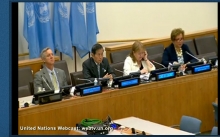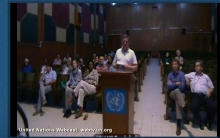How will managed mobility work?
Staff will be subject to minimum and maximum position occupancy limits that depend on the hardship level of the duty station in which they serve.
Staff will be subject to minimum and maximum position occupancy limits that depend on the hardship level of the duty station in which they serve.
A change in position can involve one or more of the following: a change of role, function, Department, duty station, or a move from the Secretariat to and from a UN agency, fund or programme.
Staff can change position by applying to a vacant position or by participating in a lateral reassignment exercise. Staff will be eligible to apply for different positions after reaching their minimum position occupancy limit and can apply to a vacant position at their current level or higher, or they can opt for lateral reassignment at the same level, within their current Job Network.
A change in position does not need to be geographic. However, one geographic move (a change in country of one year or longer) is required to be eligible to apply for positions at the P-5 and higher levels.
Staffing exercises will take place twice a year and will include vacant positions (open to staff and external applicants) as well as a lateral reassignment exercise for serving staff. Staff members who have reached their maximum position occupancy will be required to participate in a lateral reassignment exercise. A staff member can choose to “opt in” and participate in the lateral reassignment exercise earlier, if preferred.
Mobility will be phased in by Job Network. Commencing in 2016, the first Job Network will be open to mobility, followed by another Job Network in 2017, and thereafter, two Job Networks will be subject to mobility annually. This gradual approach to deployment will provide both the Organization and its staff with a two year preparation period, which also gives time for our human resources systems to be operationally ready by the time managed mobility takes effect.
Selection recommendations for both vacant positions and reassignment options will be made by “Job Network Boards”[1]. These will be composed of senior managers in the respective Job Networks. The Boards will be supported by Network Staffing Teams, which will include both human resources staff and staff with expertise in that Network.
There will be a Special Constraints Panel composed of senior managers. If a staff member is recommended for a position in a location for which they have medical constraints or other compelling personal circumstances, they can submit an exceptional request for an exemption to a “Special Constraints Panel”. The panel will review all requests and make recommendations to the Assistant Secretary-General for Human Resources Management.


